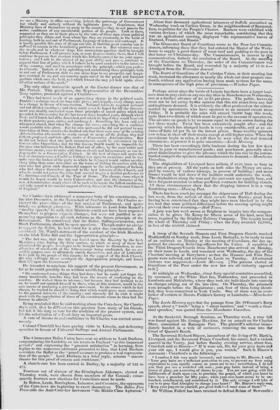The Cirencester Ballot Union have sent an address to Lord
Durham, congratulating his Lordship on his return to England " at this important period ;" and expressing the "greatest satisfaction" in learning, from replies to the numerous addresses presented to him, that Lord Durham considers the Ballot as the "grand measure to produce a real representa- tion of the people." Lord Durham, in a brief reply, returns "sincere thanks for this proof of esteem and confidence."
A church-rate has been carried in Dudley, by a majority of 922 to 475.
Fourteen out of sixteen of the Birmingham Aldermen, elected on Thursday week, were chosen from members of the Council ; conse- quently fourteen new elections for Councillors must be made.
In Bolton, Leeds, Nottingham, Leicester, and Coventry, the opponents of the Corn-laws are beginning to exert themselves. The Bolton Free Press calls the Anti-Corn-law movement " the Middle Class Agitation."
About four thousand agricultural labourers of Suffolk assembled on Wednesday week on Carlton Green, in the neighbourhood of Saxmund- ham, to petition for the People's Charter. Banners were exhibited with various devices ; of which the most remarkable, considering that this was an agricultural meeting, displayed "the representative loaves of England, France, and Russia."
The Gloucester Board of Guardians wrote to the Poor-law Commis- sioners, informing them that they had ordered the Master of the Work- house to supply a good dinner of roast-beef and pudding to the poor in that house on Christmas-day. The Commissioners, in answer to this communication, forbade the resolution of the Board. At the meettfig of the Guardians on Thursday, the order of the Commissioners was brought before the Board, and overruled by a majority of 15 to 4.- A bridged from the Worcester Journal.
The Board of Guardians of the Uxbridge Union, at their meeting last week, increased the allowance to nearly the whole out-door paupers one- fourth, without any application having been made to them for the same, in consequenle of the high price of provisions.—Windsor Paper.































 Previous page
Previous page